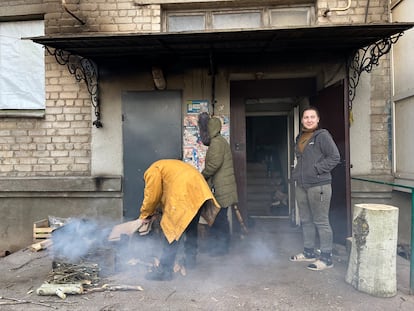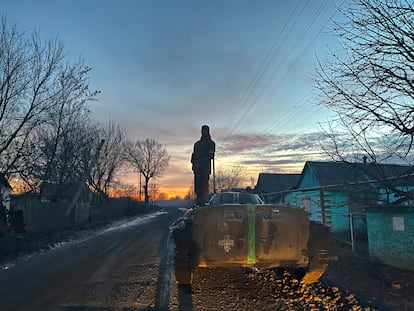Bakhmut: The fortress city at the center of bloodiest battle in Russia’s war in Ukraine
Artillery bombardments and Wagner Group mercenaries have besieged the strategic town where the civilian population has been reduced to 10% of pre-war levels and fighting has been likened to WWI


Huddled in a yellow coat, Irina stokes the fire on which she prepares food in the middle of the street. “Today we are lucky. I’m going to make goulash. I only have one piece of meat and few vegetables, but lots of spices,” she says with irony. The smoke from Irina’s fire mingles with the brown haze enveloping Bakhmut, like a small storm in the desert, the result of constant artillery bombardment. “The Russians are especially pissed off today,” spits 58-year-old Irina. Bakhmut, in the Donetsk region, once famous for its salt mines and sparkling wines, is today the hottest spot on the front lines of Russia’s war in Ukraine.
Russian shells land nearby and a group of Ukrainian soldiers rushes to a new position. Two armored vehicles speed along the potholed road in downtown Bakhmut. On Tuesday, Ukrainian President Volodymyr Zelenskiy paid a visit to the Donbas front, an area partly controlled by Russian forces. The Kremlin’s response to the audacious tour made by Kyiv’s wartime leader on the 300th day of the invasion was delivered in an incessant orchestra of mortars, missiles and artillery.

Bakhmut, Zelenskiy said, is “hell.” The ferocious defense of the Ukrainian forces has become another symbol of resistance and the country’s unity, where the slogan “Bakhmut resists” has already been added to the mythology of the war. “The east is holding out because Bakhmut is fighting. This is the fortress of our morale. In fierce battles and at the cost of many lives, freedom is being defended here for all of us,” Zelenskiy added.
Barely a building in the city has not been scarred by a war that has dragged on for 10 months with little prospect of a swift resolution. Of the 70,000 to 80,000 people who lived in Bakhmut before the invasion, only around 7,000 remain, according to local authorities. Most subsist in basements and makeshift shelters, where they live in squalid conditions and depend on humanitarian aid brought into the town by a few seasoned volunteers. A town where a normal, daily life was possible as recently May is today a panorama of trenches and huge anti-tank hedgehog traps.
Following the capture in June and July of the cities of Severodonetsk and Lysychansk, in the Luhansk region – Moscow’s biggest victories in Donbas – Russian troops started a vicious siege of Bakhmut, which had become the military center for the whole area with a large hospital to treat the wounded from various sections of the front. Moscow’s strategy in Bakhmut is the same as was employed in Luhansk, in Grozny, Chechnya, in the 1990s, in Aleppo, Syria, between 2015 and 2016, and identical to the battle for Mariupol: besiege, bombard and raze the city to the ground until resistance is broken.
Maxim, a veteran artilleryman, surveys the scene through binoculars. The constant thud of shelling shakes the ground and fighters patrol the skies. Small arms fire can be heard nearby: street-to-street fighting is already taking place in Bakhmut.
Russia’s assault began with tactical groups and infantry battalions encircling the city in support of air strikes. A few weeks ago, the invader’s tactic changed and now assault squadrons, trained in offensive strategy, are being sent against Bakhmut, says Serhii Cherevaty, a spokesman for the Armed Forces of Ukraine’s eastern group. Initially, these squads consisted of 50 troops. Now, they are operating in smaller units of around 15 soldiers. Some are badly trained and poorly equipped new recruits called up in Vladimir Putin’s partial mobilization, according to Ukrainian intelligence. But many of these strike units are made up of mercenaries from the Wagner Group, led by Yevgeni Prigozhin, who is known as “Putin’s chef” due to his catering businesses and his close ties to the Kremlin. The Wagner Group has recruited tens of thousands of prisoners from Russian jails, who are hastily trained and then sent to Bakhmut.
“The Russians don’t care about their men,” says Maxim with a bitter shrug. “They send them here to die like cockroaches, they don’t even bother to recover the bodies. When we neutralize one group, they send another. And so on and on and on.” He says that many of them have taken drugs, to the extent that they don’t feel the adrenaline of battle, or the pain.
On the Kremlin’s map of full-scale war in Ukraine, Bakhmut does not appear to hold significant geopolitical value, although it serves a logistics hub for the Ukrainian Army and losing it would complicate further efforts to push Russian forces back as well as cutting off supply lines to several areas of the front. Should Moscow succeed in capturing the city, shutting down that hub will be a blow to Kyiv but it will also serve as a symbolic and psychological victory after a string of battlefield defeats for Russian troops. Putin himself has acknowledged that the situation on the Donbas front is “extremely difficult” and has promised unlimited funds for Moscow’s forces in Ukraine. “They are suffering disproportionate losses for an army fighting a 21st century war,” said Cherevaty, although some analysts have likened the battle for Bakhmut to the trench warfare of World War I.

The Ukrainian government says casualties are huge among the Kremlin’s forces. The bodies of many Russian servicemen are still lying on the battlefield in the snow and mud. The defenders, however, are also suffering heavy losses, as Zelenskiy acknowledged before his trip to Washington to galvanize Western commitment to continued military and humanitarian aid.
Brown military ambulances are scattered around Bakhmut. Beyond the city limits, others wait to rescue the wounded and transfer them to safer areas. Russian strikes have targeted the hospital and medical staff have had to move elsewhere. Firefighters, who are holding out in a barracks in downtown Bakhmut, do not venture out when the attacks are intense; Russian shelling usually hits the same spot twice.
In the doorway of their house, Katya and Kristina, Irina’s daughters, have come out for some fresh air. The whole family, including Katya’s nine-year-old son, lives in the basement of a building full of cracks and broken glass “You know? Life before this war wasn’t very good either, but this is our home after all,” Katya says with a shrug. The young woman, with perfectly braided hair and no coat despite the sub-zero temperatures, worked as an operator in a nearby metal factory. “We women in this area are strong, resilient. Believe me, they won’t break us.”
Sign up for our weekly newsletter to get more English-language news coverage from EL PAÍS USA Edition
Tu suscripción se está usando en otro dispositivo
¿Quieres añadir otro usuario a tu suscripción?
Si continúas leyendo en este dispositivo, no se podrá leer en el otro.
FlechaTu suscripción se está usando en otro dispositivo y solo puedes acceder a EL PAÍS desde un dispositivo a la vez.
Si quieres compartir tu cuenta, cambia tu suscripción a la modalidad Premium, así podrás añadir otro usuario. Cada uno accederá con su propia cuenta de email, lo que os permitirá personalizar vuestra experiencia en EL PAÍS.
¿Tienes una suscripción de empresa? Accede aquí para contratar más cuentas.
En el caso de no saber quién está usando tu cuenta, te recomendamos cambiar tu contraseña aquí.
Si decides continuar compartiendo tu cuenta, este mensaje se mostrará en tu dispositivo y en el de la otra persona que está usando tu cuenta de forma indefinida, afectando a tu experiencia de lectura. Puedes consultar aquí los términos y condiciones de la suscripción digital.








































